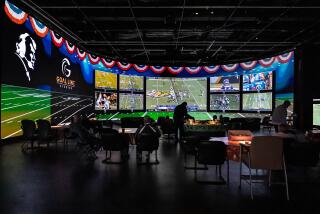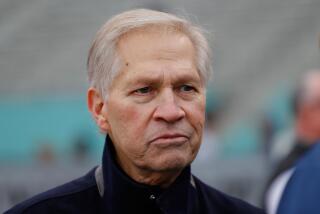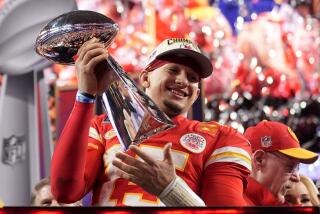Memories Run XXVI Deep
Winning a Super Bowl can turn a pro football star into a sentimentalist.
With Super Bowl XXVII ready to kick off Sunday at the Rose Bowl, TV Times asked four football broadcasters who played for Super Bowl-winning teams what was foremost in their memories of having been part of America’s most-watched sporting event.
Terry Bradshaw
The first quarterback to lead a team to four Super Bowl wins, CBS’ “NFL Today” analyst singled out the Pittsburgh Steelers’ first and last victories.
“Seeing (then-NFL commissioner) Pete Rozelle hand the Lombardi Trophy to (the late Steelers’ owner Art Rooney) tops my list,” Bradshaw said. “It was his first championship. He was such a wonderful person, a great man and great owner.
“My second greatest thrill was in Super Bowl XIV (against the Rams), running off the field, sticking my finger up in the air (signifying that) we’re No. 1 and seeing my folks and running through the tunnel.
“I had a feeling that when we were at the goal line scoring our final touchdown we’d never come to another Super Bowl again in my playing career.
“Our team was getting older and I was getting older. It was so hard to get there that year and sure enough, we never made it back. Athletes have that thing in their brain that time is marching on. You don’t dare repeat it outwardly, you keep it hidden, but I had a sense.”
Todd Christensen
The NBC analyst earned his first Super Bowl ring in 1981 as a third-string tight end and special teams player for the then-Oakland Raiders. But his favorite Super Bowl memories come from three years later--when he was a member of an Raider team that scored a 38-9 upset over the defending Super Bowl champions, the Washington Redskins.
“I remember the beginning of the fourth quarterback, (kicker) Chris Bahr and I were standing on the sideline and we looked up at the scoreboard and he said, ’35 to 9, there’s no way they are going to come back,’ ” Christensen said.
“From that time, people started to congratulate themselves. I remember hugging a number of players. Finally, with the two-minute warning, sitting down and putting my face in my hands and starting to cry in the realization of all of the things that it took to get there. I had been cut twice, sat on the bench for four years, tried out with a number of teams and that particular year was the culmination of things.”
Lynn Swann
Like Bradshaw, Swann, who is a college football analyst for ABC, has four games from which to look back on, including Super Bowl X, where he was named the game’s most valuable player after catching four passes for 161 yards and a touchdown in the Steelers’ 21-17 win over the Dallas Cowboys.
“That was an important game for me personally because I was coming off an injury and able to shake it off, start and play a good game,” said Swann.
Among Swann’s catches is one frequently replayed on highlight films where he catches it, loses control, and catches it again while falling.
“You look at it and think, ‘If I caught it the first time, it would not have been so dramatic,’ ” Swann said.
Joe Theismann
The ESPN analyst led the Washington Redskins to the Super Bowl title in 1983 over the Miami Dolphins following the strike-shortened 1982 season.
“My best memory is taking the last snap, and I couldn’t believe we were world champions,” Theismann said.
“I don’t know if most people can relate to achieving your ultimate dream in life, and that’s what that moment felt like. The combination of tears of joy and disbelief is an overwhelming feeling.
“I think Doug Williams (who quarterbacked the Redskins to a 42-10 victory over the Denver Broncos in Super Bowl XXII) put the whole Super Bowl-winning experience into perspective when he said, ‘It’s so great you never want the next season to start.’ ”
A season later, the Redskins had the league’s best regular-season record (14-2) and won two playoff games for another trip to the Super Bowl.
But things did not go as well in Super Bowl XVIII, as the Raiders took a 14-3 lead on Derrick Jensen’s end-zone recovery of his block of Jeff Hayes punt and Jim Plunkett’s 12-yard touchdown pass to Cliff Branch.
With 12 seconds left in the first half and the ball on Washington’s 12-yard line, Coach Joe Gibbs called for Theismann to throw a screen pass to Joe Washington.
That call led to one of the most embarrassing plays in Super Bowl history, as linebacker Jack Squirek stepped in front of Washington, made the interception and took a few steps into the end zone giving the Raiders a 21-3 advantage.
“Before the play I tried to talk (Coach) Joe Gibbs out of it,” Theismann said. I didn’t think throwing the football where we were was a very good thing to do. He thought it was.
“As I walked out on the field, I had a feeling this was not going to be a good situation. After the play, I was convinced it was not a great situation.”
More to Read
Go beyond the scoreboard
Get the latest on L.A.'s teams in the daily Sports Report newsletter.
You may occasionally receive promotional content from the Los Angeles Times.










